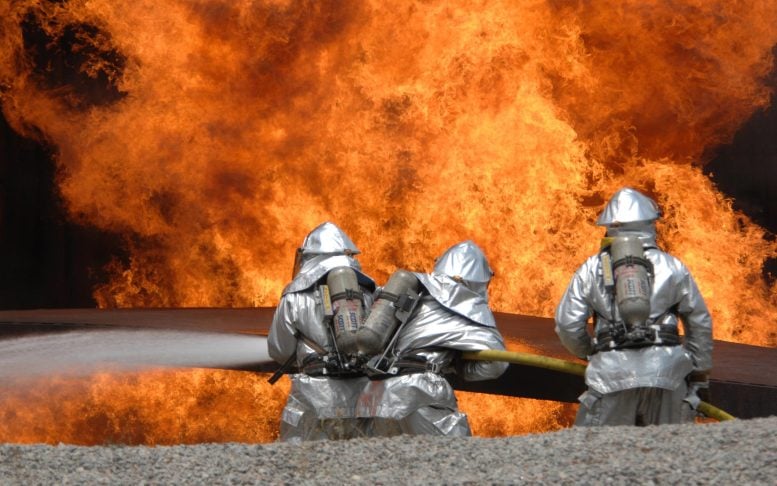
A new study from the Ben-Gurion University of the Negev examined the prevalence of Post-Traumatic Stress Disorder (PTSD) among Israeli firefighters. The research shows that 67% of the operational firefighters in Israel showed partial PTSD, 24% suffered from full PTSD, and only 9% showed no signs of PTSD or partial PTSD.
Professional firefighters are frequently exposed to extreme stress during their work in emergency situations. In addition to the physical challenges of firefighting, they must evacuate burned and injured victims or bodies. Their involvement in traumatic events exposes them not only to the pressures stemming from the traumatic event itself, but also to post-traumatic emotional expressions that result in secondary traumatization. For the first time, Dr. Marc Lougassi, a firefighter himself as well as a doctoral student in the Faculty of Health Sciences, examined the prevalence of Post-Traumatic Stress Disorder (PTSD) among Israeli firefighters, and how they cope.
It is important to note that as far as Israeli firefighters are concerned there has been no documented evidence of PTSD prevalence, despite the fact that they are exposed to additional traumas such as war and terror strikes that add to the traumas they experience in the course of their daily shifts, says Lougassi.
PTSD can occur after exposure to serious injury or death to oneself or another and then recurring stress symptoms such as nightmares, difficulty sleeping and others for over a month.
The results of this study revealed for the first time the prevalence of PTSD among the operational firefighters population (regular and flight) in Israel. The findings indicate that 24% of the operational firefighters in Israel suffer from full PTSD, 67% showed partial PTSD, and only 9% showed no signs of PTSD or partial PTSD. On the other hand, only 5% of the flight firefighters in the Ben-Gurion Airport Firefighting Services had PTSD, and 50% of them showed no PTSD or partial PTSD symptoms.
Three hundred and forty two operational firefighters were recruited for this study, from all age groups, marital status (single, married, divorced), educational levels, seniority (over two years), operational status (firefighter, crew leader, officer, service commander, etc.). Firefighters with a psychiatric background, head injuries (loss of consciousness and neurological disturbances), in psychiatric and or psychological treatment, firefighters with chronic diseases and those taking medications on a regular basis were excluded from the sample.
The research group included 300 operational firefighters from all firefighting services in the country who were selected according to a large multi-year average (relative to firefighters who are not included in the study) of several traumatic events to which they were exposed in recent years (beginning in 1997). An additional 42 firefighters from flight firefighting services at Ben-Gurion Airport constituted the control group, based on the assumption that the amount of traumatic events that these firefighters are exposed to is insignificant. At the start of this study, the total number of operational firefighters in Israel was 1159 from firefighting services, and 72 firefighters from the largest flight firefighting service in Israel at Ben-Gurion airport.
These results support the hypothesis that increased exposure to recurring traumatizing events is a significant factor contributing to PTSD development, according to Lougassi.
The findings of this study can help researchers and the Israeli Firefighting Service improve the firefighters abilities to cope with extended exposure to traumatizing events through professional intervention programs, he suggests. Moreover, these results can help the Israeli firefighting services develop appropriate screening tools to be used during the recruiting process of new firefighters, in order to assure their future psychological safety.
Lougassi offers several recommendations to help alleviate and prevent PTSD.
- Develop a psychological screening tool consisting of questionnaires (such as CSE) and personal interviews to enable identification of candidates with high susceptibility to PTSD.
- Develop updated training programs that consider relevant developments in the area of individual preparation for functioning in stressful situations: for example, controlled exposure of firefighters to traumatizing events. It is important that this training be given during the early stages of recruitment.
- To establish in all services professional units for treating emotionally injured firefighters to prevent distress. It is recommended that the unit focus on the organizational and individual levels.
- To enlarge and reinforce the social support networks for firefighters. For example, seminars that support motivation, discussing case studies of successful events, and using the media, social activities and meetings with officers.
- Strengthening the connections between the firefighting services and the firefighters’ families: To engage families in social events and disseminate information about changes in the nature of the work and the expected stress.
- Increase officers’ awareness of personal coping in stressful situations and traumatizing events, and encourage the implementation of professional workshops that enable early detection of problems stemming from these kinds of events.
Lougassi shared his research results with the head of the Firefighters Union Yoav Gadasi who was quite appreciative. He also showed the research to Fire Service Commander Shahar Ayalon who decided to adopt Lougassis conclusions and ordered his staff to ascertain how to incorporate them into standard practice.